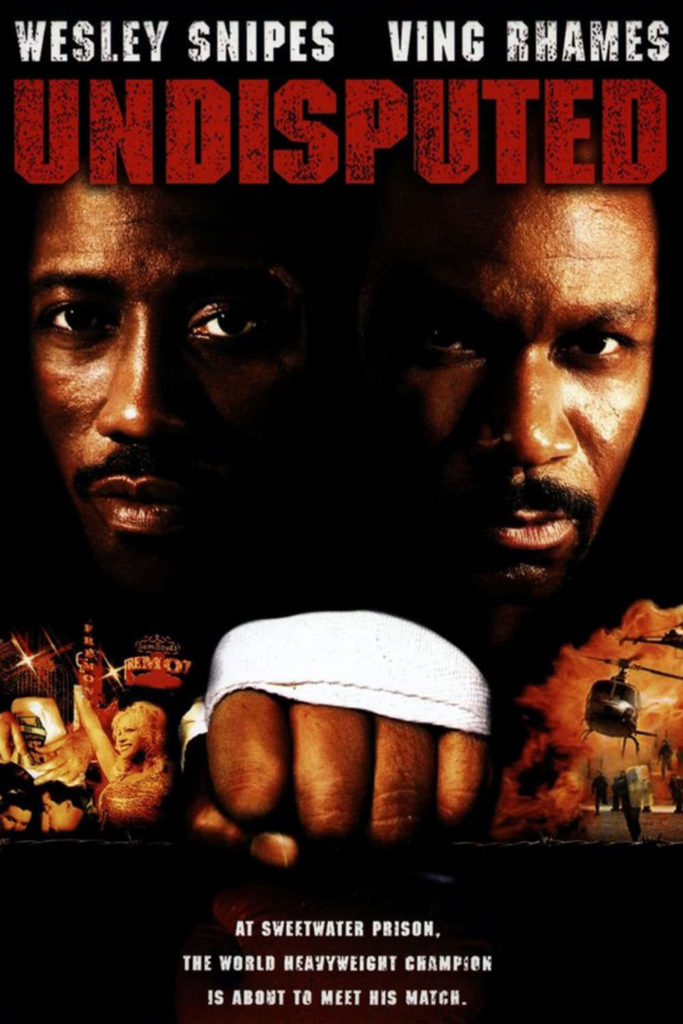Monroe Hutchens (Wesley Snipes) is a hell of a boxer. In fact, he has never lost a fight. The big problem for Hutchens, though, is that all the boxing he’s done for the past ten years has been care of the California Department of Corrections. Once the California state champ for his weight class, Hutchens was poised to enter into a lucrative professional boxing career when he came home to find his woman in bed with another man. Hutchens beat the paramour to death and was sentenced to life without parole for the murder. While in prison, he continues to ply his trade, doing his time and beating up on the boxing champions from other prisons around the state.
Meanwhile, George ‘Iceman’ Chambers (Ving Rhames) managed to keep his hands clean long enough to become the undisputed heavyweight champion of the world. But, in a career decline that mimics that of Mike Tyson, Iceman was convicted of rape, and is on his own way to prison. As it happens, he’s going to the same facility that houses Hutchens.
Two undefeated boxers, one the champion of the outside world, one the champion of the inside world. This is the setup for Undisputed, the 2002 film written by Hollywood veterans Walter Hill and David Giler, and directed by Hill.
Is it a prison movie? Is it a boxing movie? It’s both. But, mostly, the film encapsulates, in a clever way, prefight hype and all the other stuff leading up to a bigtime bout. Two fighters grab the interest of the public — in this instance, the inmates of Sweetwater prison — and agree to a fight for the ages.
The fight was always going to happen, no matter what, but still needed an instigator. That instigator is mobster Mendy Ripstein (Peter Falk). He’s spending his last days at Sweetwater, reminiscing about the old days with his helper, fellow inmate Chuy Campos (John Seda). Among Epstein’s fondest memories are great fights of the  past, which he claims to have seen in person. When Iceman arrives at Sweetwater, Epstein sees an opportunity. He believes, against all other evidence, that Hutchens can defeat the champ. Through some subtle maneuvering, he arranges the fight, using a version of the old London Prize Ring Rules. In short, there is no set number of rounds. The fight goes on until one fighter is knocked out or gives up. As for those rounds, they have no time limit. They go on until one fighter is knocked down, followed by a break. Epstein believes these rules, which were supplanted by the rules which became the basis for modern boxing, are the purest expression of the sport. All that remains is the fight in the final act.
past, which he claims to have seen in person. When Iceman arrives at Sweetwater, Epstein sees an opportunity. He believes, against all other evidence, that Hutchens can defeat the champ. Through some subtle maneuvering, he arranges the fight, using a version of the old London Prize Ring Rules. In short, there is no set number of rounds. The fight goes on until one fighter is knocked out or gives up. As for those rounds, they have no time limit. They go on until one fighter is knocked down, followed by a break. Epstein believes these rules, which were supplanted by the rules which became the basis for modern boxing, are the purest expression of the sport. All that remains is the fight in the final act.
There is more to the plot than this, of course. But everything is peripheral to the main event at the end of the film. It doesn’t really matter how the two fighters get to the ring, as long as they get there. Hill recognized this, keeping the whole prison aspect of his film toned down and reasonable. Even though there is a little conflict here and there, as one expects in a prison flick, there is none of the heavy oppressiveness that came to typify Oz, which was airing on HBO at the time.
At first, the film strays into cliché, setting up Snipes as the underdog hero of the tale, and Iceman the villain. But, Hill and Giler’s characters have more depth than that. There is a reason for everything these two characters do, and after Hutchens is locked away in solitary for a good deal of the film, it is left to Rhames to carry the film. It would have been harder to do that if he was a one-dimensional villain. What we have, then, is a film with two dueling protagonists, making it hard to pick any one to root for or against. This has the effect of making the outcome of the fight less predictable for the viewer.
Snipes and Rhames were the perfect pairing for the roles. Rhames is a better actor, which is probably why he was given more lines, but both of them inhabit their roles completely, despite both being a touch too old.
Undisputed is not that memorable of a film. It came and went from theaters quickly, and didn’t show a profit. But it’s an entertaining romp that isn’t burdened by things like realism or believability. It’s a film that promises a fight, and builds up to it. Job accomplished.
